Have you ever had a dog escape your fence? Searching for your dog in the neighborhood isn’t safe for them and can be a stressful for you. If you’ve done this before or want to make sure to avoid that situation, you’ve come to the right place because we’re going to talk about ways to keep your dog from escaping a fenced-in yard.
Why Does My Dog Try To Escape The Yard?
Ideally, you’ll have your yard set up as a place for your dog to potty, nap and play, but even the most inviting yard can become boring for your dog. Your dog may jump the fence or try to escape your yard for several reasons. They can range from looking for a new friend to chasing squirrels, being territorial, boredom and more. And this can lead to behaviors like digging under and climbing over your fence, figuring out the gate latch, trying to dash out when you open the gate or even chewing through the fence.
How to Keep Your Dog Inside the Fence

If you don’t have a fence or are looking for an economical way to keep your dog safe in the yard, you can buy an in-ground or wireless pet fence. They both work by creating a boundary that interacts with a receiver collar worn by your dog to let him know where the boundary is. If your pet goes past the boundary, he will receive a static correction. The static correction is harmless and similar to the sensation you feel when touching a doorknob after walking on a rug in socks. Like a tap on the shoulder, this sensation is enough to get your pet’s attention so that they stay safe in their yard. It usually takes about 14 days of training to teach your dog the boundaries, but it can take less time if your pet is a speedy learner. A pet fence can also work with a traditional fence to keep dogs from jumping over it or digging under it. Another benefit of a pet fence is that you can keep your pet safe in the front yard without blocking the view or ruining the look of your house with a physical fence.
If you have a fenced-in yard, let’s take a look at some steps you can take to prevent your pup from escaping.
How to Stop a Dog From Digging Under Your Fence
You may have a dog that’s been a digger since it was a puppy or developed into one while pursuing chipmunks or by trying to get under your fence to escape. If your dog likes to dig, here are some ways to prevent him from escaping.
Add a Wireless Pet Fence
As mentioned above, adding a wireless pet fence along with your traditional backyard fence creates an extra barrier to prevent your dog from digging. Another benefit of a wireless fence is that it has a circular boundary that can cover up to ½ or ¾ of an acre so, it can extend to your front yard too.

L-Footers at the Base of Your Fence
While most of us are familiar with L footers on the tops of fences, you can also put them on the bottom where the fence meets the ground to prevent your dog from digging out. They can be made of hardware cloth, chicken wire or chain–link fence. You can bury it if you want to make the appearance more appealing, but you can also let it rest on top of the grass using rocks, planters, mulch or gravel to hold it down.
If your pup is very persistent, you can pour concrete around the base of your wall to create an impenetrable L-footer to stop even the most determined diggers.
How to Stop a Dog From Jumping the Fence
Whether you have a 5-foot chain-link fence or a 6-foot privacy fence, some dogs find a way to get over just about anything. So, let’s review some ways to prevent this from happening.
Add a Pet Fence To Your Traditional Fence
As previously mentioned, adding an in-ground pet fence next to your traditional backyard fence creates an extra barrier along the fence line. Once your dog learns the boundaries, he’ll refrain from climbing over your traditional fence as well as digging under it too.

A Little Landscaping Goes a Long Way
Planting dense shrubs in front of your fence will not only improve the appearance of your yard but will make it harder for your dog to get a running start to jump over your fence.
Remove Anything That Helps Them Climb
Dogs are smart, especially when they don’t think you’re watching, and they can use just about anything near a fence to help them get over it. So, remove things like low-hanging tree limbs near the fence, garbage cans, firewood, a lawnmower or anything else that would give them a leg up.
Add a Lean-In to Your Fence
A lean-in extends the top of your fence and tilts inward to prevent dogs from getting over. You can build or find premade mounts that attach to a fence to run chicken wire, farm wire, or other netting and fence material to create a canopy on the inside of your fence. This will cause your dog to see the fencing above him and deter future escapes.
Keep Your Dog Safe and Happy

If your dog does escape, never punish him when you find him or when he returns home. If anything, punishing will make your dog afraid to come home while not hindering his desire to escape. Also, make the backyard a happy place where he’ll want to be. Always have fresh water; if your dog likes to fetch, he’ll love having an automatic ball launcher. You can also leave a treat-dispensing toy that can keep him busy for hours. Finally, The American Kennel Club recommends taking daily walks with your dog. If it’s challenging to walk your dog because he pulls on the leash, there are dog harnesses that gently redirect your dog’s attention back to you so you both can enjoy your walk. In addition, by keeping your dog active, he won’t have as much pent-up energy, is less likely to escape and he’ll be more content to stay in your yard.
